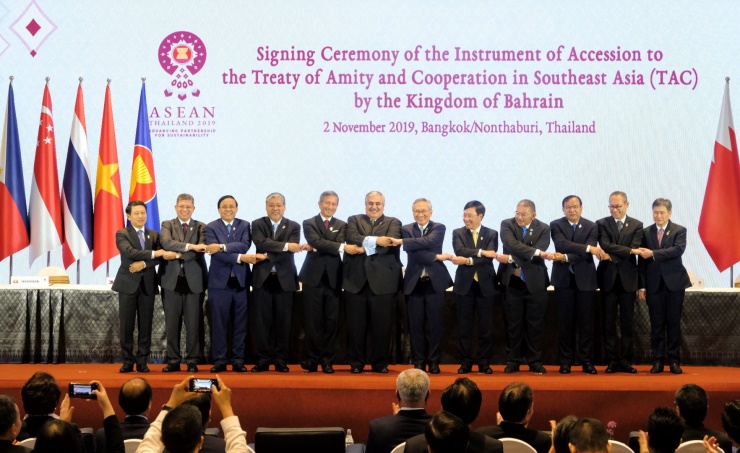ID :
548500
Sun, 11/03/2019 - 01:38
Auther :
Shortlink :
https://www.oananews.org//node/548500
The shortlink copeid
Bahrain’s accession to TAC to strengthen its relations, cooperation with ASEAN countries

Manama, Nov. 2 (BNA): In line with the directives of His Majesty King Hamad bin Isa Al Khalifa on the need to consolidate cooperation with all sides, encourage dialogue among civilisations, cultures and religions, support all efforts to promote regional and international security and peace, and expand relations and joint cooperation with the Asian continent, in general, and ASEAN, in particular, the Kingdom of Bahrain has acceded to the Treaty of Amity and Cooperation in Southeast Asia (TAC).
The accession of the Kingdom of Bahrain to TAC came as the Minister of Foreign Affairs, Shaikh Khalid bin Ahmed bin Mohammed Al Khalifa, on Saturday, November 2, 2019, signed the Instrument of Accession to TAC in Bangkok, following Royal Decree 89/2019, approving the Kingdom’s accession to the Treaty and its amended protocols until 2010.
The Signing Ceremony of the Instrument of Accession to the Treaty of Amity and Cooperation in Southeast Asia (TAC) took place during the 35th ASEAN Summit and Related Summits, held in Bangkok on 2-4 November.
The accession to the Treaty came after unanimous agreement of the Association’s 10-member states, making Bahrain the third Arab country to join it along with the Arab Republic of Egypt and the Kingdom of Morocco.
This move has its strategic implications as the Treaty represents a gateway to the Southeast Asian region, thus significantly contributing to the development of the Kingdom of Bahrain's relations with ASEAN countries.
These promising relations are of particular significance to the Government of the Kingdom of Bahrain, under the leadership of His Royal Highness Prime Minister Prince Khalifa bin Salman Al Khalifa, and His Royal Highness Prince Salman Bin Hamad Al Khalifa, the Crown Prince, Deputy Supreme Commander and First Deputy Prime Minister.
This is reflected in the Kingdom of Bahrain’s hosting of the first and third ASEAN-GCC Ministerial Meetings in May 2009 and November 2013 respectively.
In addition to the establishment of the ASEAN-Bahrain Council in 2017, with the objective of developing trade, economic, tourism and cultural relations to benefit both Bahrain and the ASEAN countries, which led to a substantial boost of trade exchange, investment opportunities and created constructive economic partnerships between the two sides.
The Kingdom's accession to the Treaty of Amity and Cooperation in Southeast Asia underlines the pivotal role played by the Ministry of Foreign Affairs in facilitating cooperation between the GCC and ASEAN.
This was endorsed by the Kingdom of Bahrain hosting the 3rd ASEAN-GCC Ministerial Meeting on 26 November 2013, with the aim of deepening bonds of joint action between two sides in two strategic areas of vital importance to trade and global economy.
The Association of Southeast Asian Nations (ASEAN), was established on 8 August 1967 in Bangkok, the Kingdom of Thailand, and is composed of 10 countries, namely: Brunei Darussalam, Kingdom of Cambodia, Republic of Indonesia, Lao People's Democratic Republic, Malaysia, Republic of Myanmar, Republic of Philippines, Republic of Singapore, Kingdom of Thailand and the Socialist Republic of Vietnam.
ASEAN is considered one of the most pioneering models at the international level and is of great economic importance due to it being one of the largest producers of raw materials and boasts of the third largest labour force in the world, given its large population, which makes it able to attract foreign investments as the ASEAN ranks second globally in this regard.
Besides, ASEAN, particularly Southeast Asia, has also significant natural resources, fertile arable land and an important energy reserve of petroleum and natural gas.
TAC, which the Kingdom of Bahrain has acceded dates back to February 1976 by the Founding Fathers of ASEAN, during its first summit in the Republic of Indonesia, where ASEAN leaders signed the Treaty of Amity and Cooperation in Southeast Asia and the ASEAN Consensus, and in implementation of these agreements, ASEAN countries were able to drastically strengthen their cooperation, in the political, economic and military fields and adopted practical strategies for rapid development of their economies.
In 1987, the Treaty was amended to allow non-ASEAN countries to accede upon unanimous ASEAN Member- States approval, so the number of non-ASEAN countries that have acceded later mounted to 30, with today’s accession of the Kingdom of Bahrain and the Federal Republic of Germany.
The signatories include the Arab Republic of Egypt, the Kingdom of Morocco, the United States of America, the United Kingdom, the French Republic, the Russian Federation, the People's Republic of China and the European Union.
The Treaty aims to promote lasting peace and long-term friendship, cooperation among the peoples of the signatory sides in a way that contributes to their solid and close relations, guided by such fundamental principles as mutual respect for independence, sovereignty, equality, territorial integrity, and national identity of all nations as well as non-interference in the internal affairs of one another, the settlement of differences and disputes in a peaceful manner and the renunciation of the threat or use of force.





